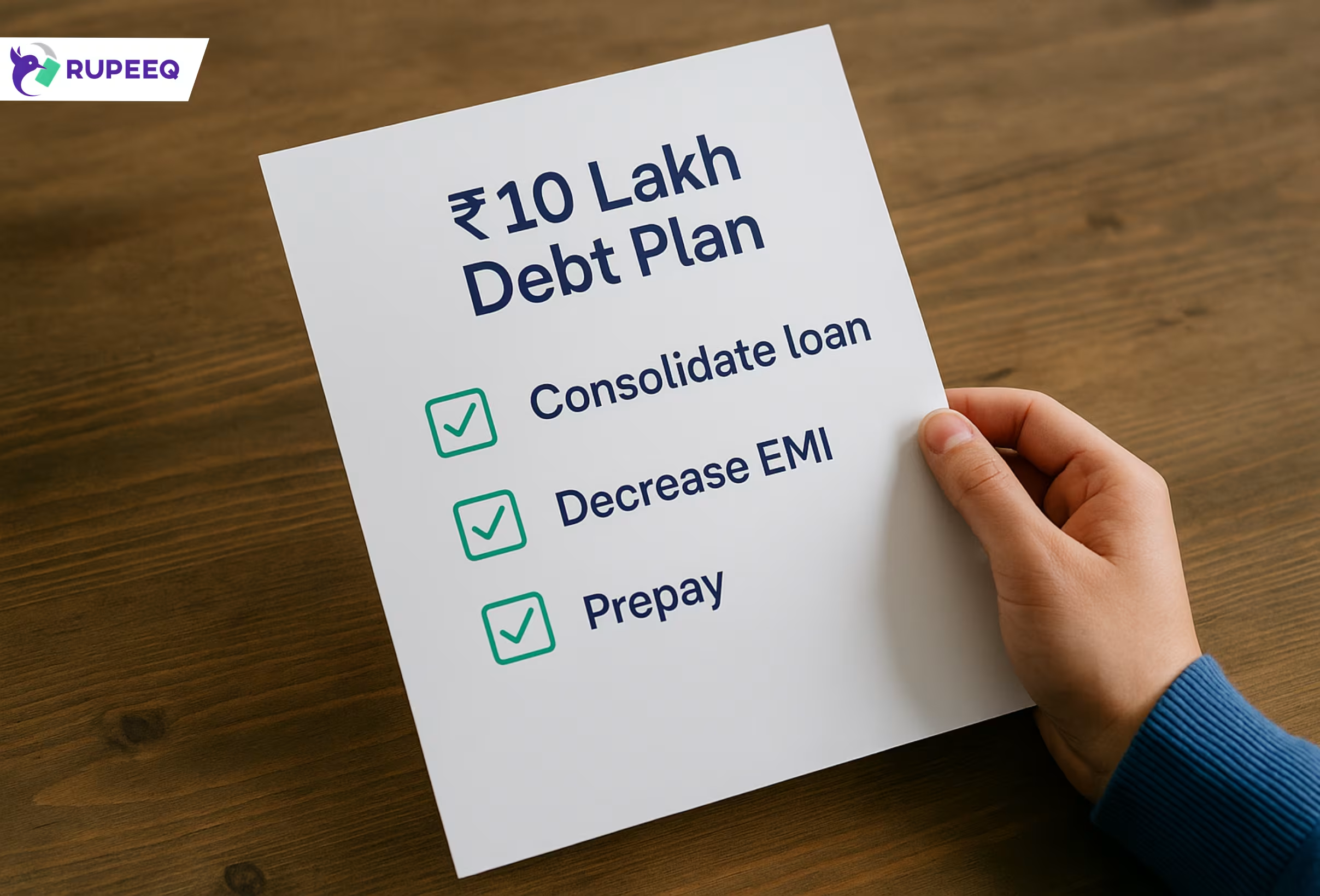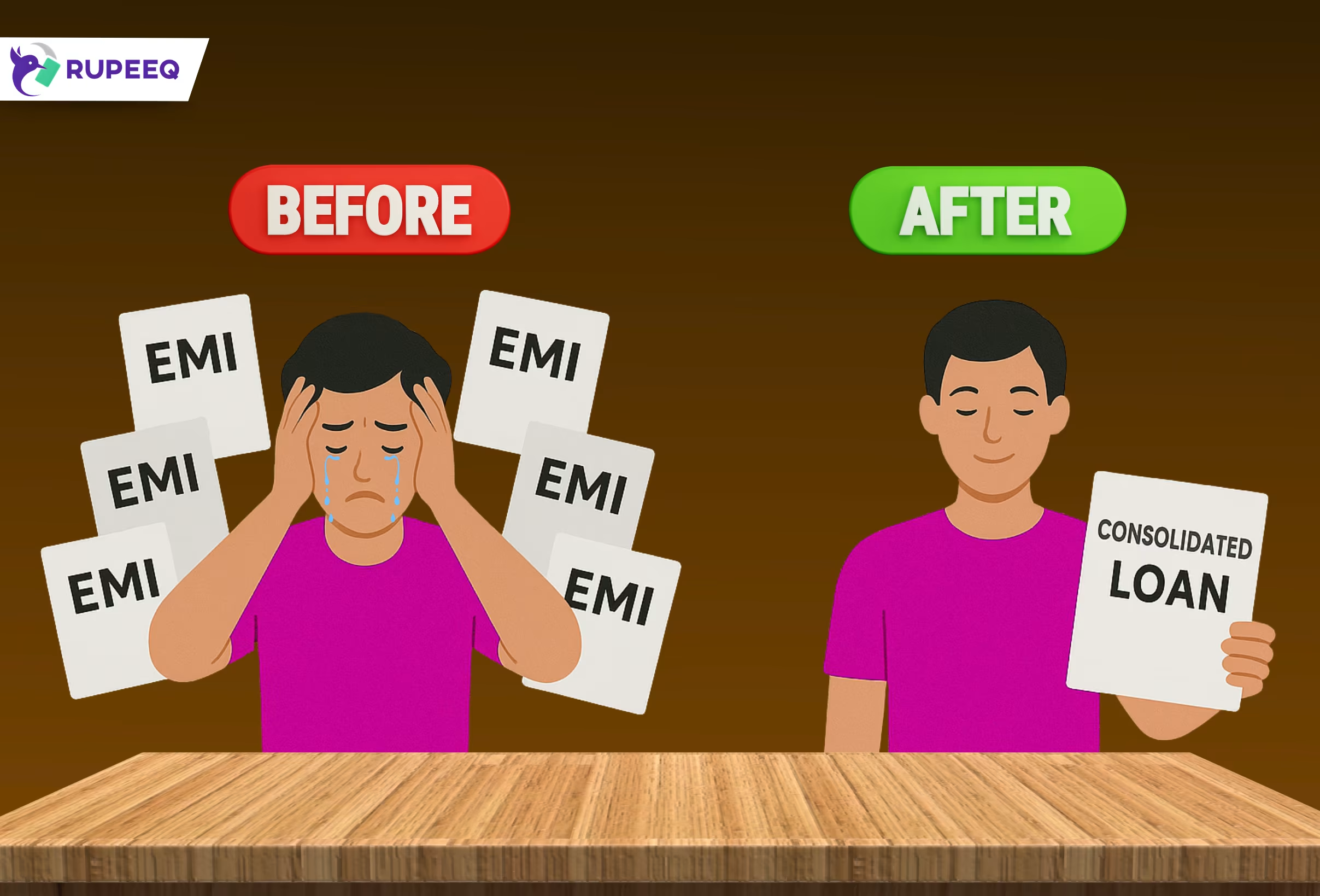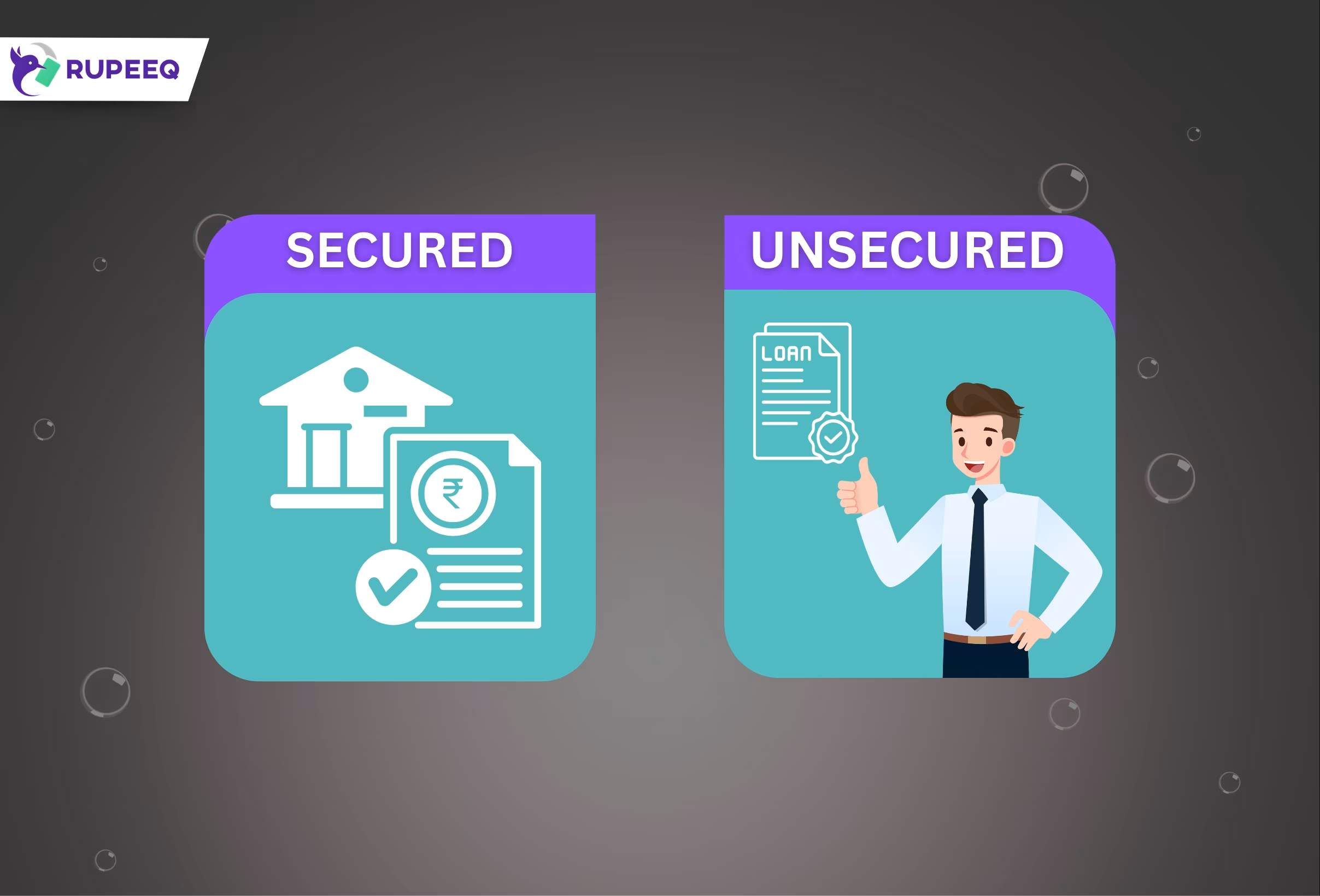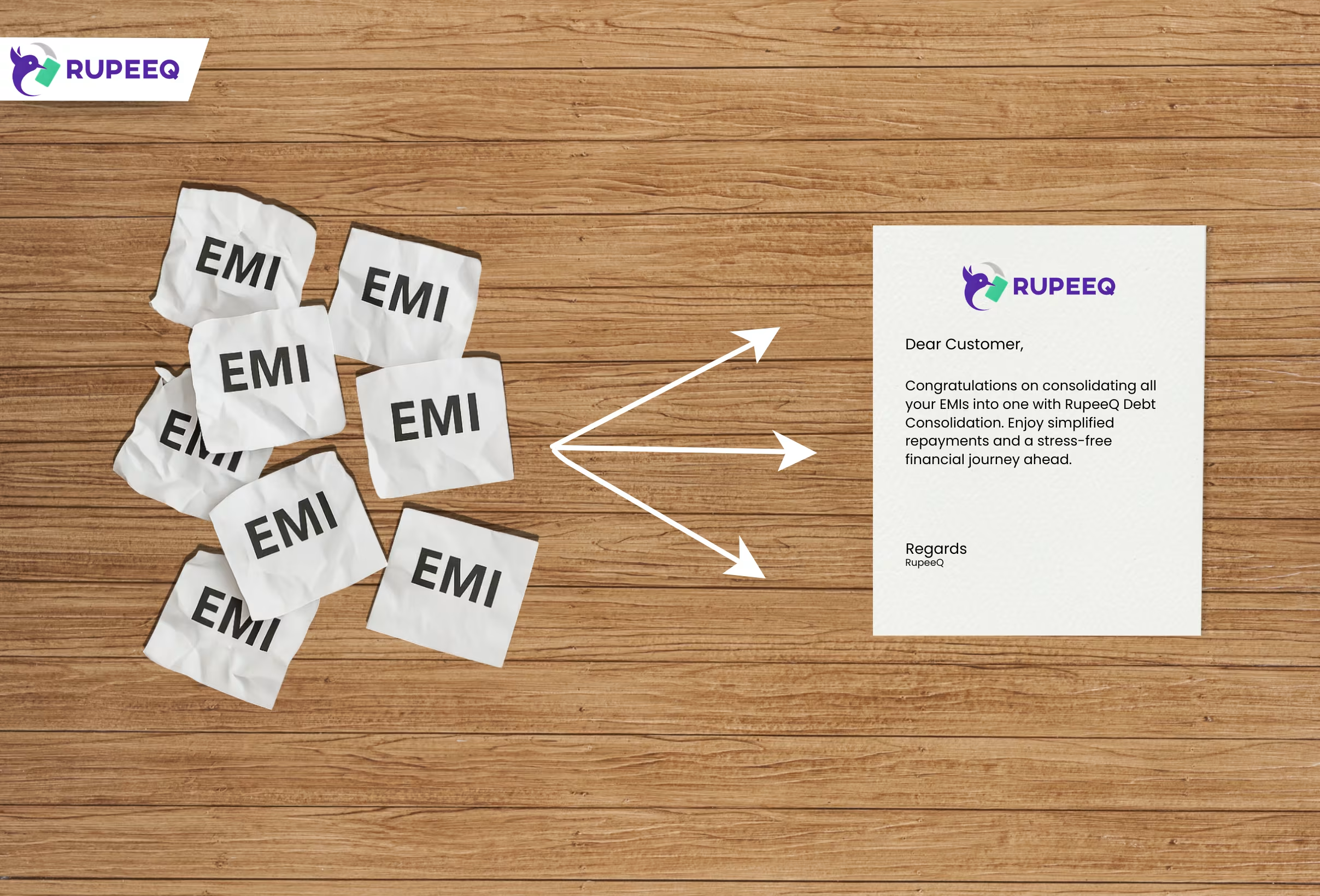If you’re considering a debt consolidation loan, one of the most important factors you’ll want to understand is the interest rate. The rate you get determines not just your monthly EMI, but also the total cost of repaying your debt. A lower rate can help you save significantly, while a higher one could defeat the purpose of consolidating in the first place.
In this blog, we’ll explain how interest rates work on consolidation loans, what affects them, typical ranges you can expect in India, and how to get the best possible rate based on your profile.
What Is a Consolidation Loan?
A debt consolidation loan is a type of personal loan that is used to repay multiple existing loans. Instead of paying different EMIs to different lenders, you combine all your debts into a single loan and pay just one EMI every month.
This not only simplifies repayment but also gives you a chance to reduce your overall interest burden—if you’re able to secure a better interest rate.
What Is the Interest Rate on a Consolidation Loan in India?
In India, the interest rate on a debt consolidation loan typically ranges between 10.50% and 24% per annum, depending on various factors like your credit score, employment status, income level, and lender type.
| Borrower Type | Interest Rate Range (Approx.) |
| Salaried (Top-tier employer, high credit score) | 10.50% – 13% |
| Salaried (Average profile) | 13% – 18% |
| Self-employed or low credit score | 18% – 24% |
RupeeQ Tip: If your existing loans are at 16–20% interest and you qualify for a consolidation loan at 12%, you can save thousands over the full loan tenure.
What Determines the Interest Rate on a Consolidation Loan?
Lenders assess your credit profile to decide the interest rate for your consolidation loan. Here are the key factors they look at:
1. Credit Score
This is the most critical factor. A high score (700 and above) shows good repayment behavior and usually results in lower interest rates.
Impact:
- Score 750+: Best interest rates
- Score 650–749: Moderate rates
- Score below 650: Higher risk, higher rates or rejection
2. Income and Employment Type
Salaried individuals working in reputed companies are considered lower risk. Self-employed borrowers may get slightly higher rates due to income variability.
Impact:
- High, stable income = better rate
- Frequent job changes or irregular income = higher rate
3. Loan Amount and Tenure
Smaller loan amounts (₹1–2 lakhs) may have slightly higher rates than larger loans, due to risk-reward balance for lenders. Similarly, longer tenures may attract higher rates.
4. Existing Debt Profile
If you’re consolidating multiple high-interest loans or credit card dues, lenders will consider your existing repayment history. Frequent delays or over-leveraging can lead to higher rates.
5. Lender Policies
Banks, NBFCs, and digital lenders all have different pricing models. Some lenders focus on low-risk borrowers, while others specialize in sub-prime (low-score) segments and may offer higher rates.
RupeeQ Tip: Use RupeeQ to compare debt consolidation offers from multiple lenders based on your credit profile—this helps you identify the lowest available rate in seconds.
How Is the Interest Charged on a Consolidation Loan?
Most consolidation loans in India use a reducing balance interest calculation, which means interest is charged only on the remaining principal every month. As you repay, the interest portion decreases and the principal portion increases.
Example:
- Loan amount: ₹5,00,000
- Tenure: 5 years
- Interest Rate: 12% p.a.
- Monthly EMI: ₹11,122 (approx)
- Total Interest Paid: ₹1.67 lakh
If your old loans were at 18% and you paid ₹15,000 in combined EMIs, consolidating to a 12% loan saves you both monthly outgo and interest cost.
Is the Interest Rate on a Consolidation Loan Fixed or Floating?
Most debt consolidation loans in India come with fixed interest rates, meaning your EMI will remain the same throughout the tenure. This is preferred by most borrowers as it gives predictability in planning finances.
Some lenders may offer floating rates, but these are more common in secured loans or balance transfer products.
How to Get the Best Interest Rate on a Consolidation Loan
Here are some practical tips to reduce the interest rate you pay:
1. Improve Your Credit Score
Pay off any overdue EMIs, reduce your credit card utilization, and avoid applying for new loans before submitting your application. Even a 20–30 point improvement in your score can lower your rate.
2. Choose the Right Loan Tenure
Shorter tenures attract lower interest rates, but result in higher EMIs. Choose a tenure that balances affordability and total cost.
3. Compare Multiple Lenders
Never accept the first offer blindly. Use platforms like RupeeQ to view multiple lender offers and select the one with the lowest rate and best terms.
4. Use Pre-Approved Offers
Lenders often give better rates to pre-approved customers. RupeeQ shows pre-qualified offers based on your profile—saving you time and helping avoid unnecessary hard enquiries.
5. Avoid Middlemen or Agents
They may charge processing fees or direct you to lenders with higher payouts instead of better terms. Stick to trusted digital platforms with lender integrations.
Final Thoughts
So, what is the interest rate on a debt consolidation loan?
It typically ranges between 10.50% and 24%, based on your credit score, income, and lender. While the rate can vary, the key is to find an offer that lowers your overall interest burden compared to your existing loans.
Debt consolidation isn’t just about combining loans—it’s about replacing high-cost debt with smarter, lower-cost borrowing. And the interest rate you get determines whether that move truly saves you money.
Looking to consolidate your loans at a lower rate?
Visit RupeeQ.com to check your credit score, compare personalized offers from top lenders, and lock in the best interest rate—100% online, fast, and secure.







